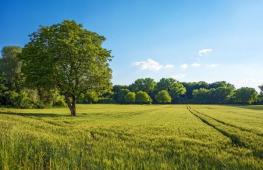“There is in the original autumn” - (analysis)
A poetic work, as you know, is much more complicated than a prose work in its content: here is a huge thematic material, “squeezed” into a very limited form, and an increment of meanings that elude an inattentive gaze, and a mass of unsaid, arising in the imagination of an insightful reader. Each word in a lyrical work, even the smallest one, can tell a lot.
In the poems of Tyutchev, the unsurpassed master of landscape lyrics, the word takes on a new meaning: it begins to sound differently. Almost all of his poems are original sketches of various seasons: reading the poems of F. I. Tyutchev, the reader can immediately reproduce in his imagination the features of winter or summer, spring or autumn.
Tyutchev's depiction of nature deserves the closest attention. It is impossible to imagine a person's life in which there is no place for admiration for the beauty of the surrounding world. Admiration for the beauty of nature is one of the distinguishing features of Tyutchev's poetry. That is why every poem praising native nature deserves the closest attention.
Tyutchev depicts nature as a living being that lives and changes. The poet shows how closely nature is connected with human life. Indeed, the world around us has a huge impact on a person. In this poem, the poet speaks of the beginning of autumn. This is an amazingly beautiful time. Nature seems to give goodbye to all its bright colors. Nature is getting ready for bed, finally pleasing the human eye with magical beauty. Days become inexpressibly beautiful, the world around is amazingly beautiful. The weather brings special joy - mild, striking with its magical calmness: There is a short but marvelous time in the initial autumn - The whole day stands as if crystal, And the evenings are radiant ...
But at the same time, the human soul is disturbed by painful thoughts. Autumn is always a reminder the onset of cold weather. Therefore, certain changes appear in the world around us, forcing us to experience the last days of warmth especially acutely.
Where a vigorous sickle walked and fell an ear, Now everything is empty - space is everywhere, - Only cobwebs thin hair Shines on an idle furrow.
People finish their usual work associated with the onset of the new season. Preparations for winter are in full swing. Now the fields are no longer pleasing with the violent growth of wheat, the cold is gradually creeping up.
The air is empty, the birds are no longer heard, But the first winter storms are far away - And pure and warm azure is pouring On the resting field...
Nature gives a person a wonderful opportunity to relax before the onset of winter blizzards, to enjoy the beauty of the surrounding world. Moreover, the usual work is completed and you can immerse yourself in the contemplation of the beauties of nature.
The poem creates a vivid and distinct feeling of the inseparable connection of a person with the outside world.  The beauty of nature does not exist by itself. It makes a person especially keenly feel his belonging to this world. It is impossible to indulge in gloomy reflections and reflections, watching the leisurely change of seasons that affects the mood so unobtrusively and easily.
The beauty of nature does not exist by itself. It makes a person especially keenly feel his belonging to this world. It is impossible to indulge in gloomy reflections and reflections, watching the leisurely change of seasons that affects the mood so unobtrusively and easily.
The poet uses the most exquisite epithets that convey his attitude to the world around him: “wonderful time”, “crystal day”, “radiant evening”. What is behind these words? First of all, the poet wants to show his admiration for everything that surrounds him. All nature enjoys the change of seasons, the onset of the most beautiful time of the year - autumn.
“Crystal Day” is an amazing intangible jewel. It cannot be touched, it can only be felt. And how happy a person must be who knows how to admire what surrounds him! “Crystal Day” in the understanding of the reader seems surprisingly beautiful and transparent. The familiar outlines of objects and phenomena in the transparent air begin to seem even more pure and gentle.
This amazingly beautiful “wonderful” time is very short. Before you know it, the cold will take its toll. And the surrounding world will lose such an exciting brightness of colors. The first cold rains and winds will wash away the transparency and radiance of the “crystal day”. And a person will only have to remember this amazing time. It is no coincidence that “cobwebs of thin hair” are mentioned. The hair can always break easily. And this will certainly happen as soon as the period allotted by nature for admiring the initial autumn passes.
The surrounding nature right now evokes thoughts of freedom, because a person is surrounded by an undisguised space. The field is empty. But this emptiness is not sad, but, on the contrary, joyful. The field is resting, the land has worked hard, gave people a great harvest. The soft rays of the sun illuminate everything around, emphasizing and revealing all the expressiveness of individual details.
In summer, the sun dries up, it is too cruel, so you want to hide from it. The autumn sun, on the contrary, is soft, gentle. I want to fully enjoy its radiance and warmth. The evening gives a special joy: neither the breeze nor the rain overshadow the magnificence of the surrounding nature.
 “Radiant Evening” seems to shine with different colors. The palette of nature is surprisingly rich. It has many colors, shades and halftones. Even the best artist cannot compare with the picture that autumn itself paints. "Clean and warm azure is pouring." Azure is reminiscent of a pure, soft blue color. This is how the world around us appears with the onset of early autumn. This poem celebrates the autumn calmness, which is also the hallmark of this season. Silence excites, makes you think about human life. Contemplating the beauties of the surrounding world is one of the ways to make a person at least a little happier.
“Radiant Evening” seems to shine with different colors. The palette of nature is surprisingly rich. It has many colors, shades and halftones. Even the best artist cannot compare with the picture that autumn itself paints. "Clean and warm azure is pouring." Azure is reminiscent of a pure, soft blue color. This is how the world around us appears with the onset of early autumn. This poem celebrates the autumn calmness, which is also the hallmark of this season. Silence excites, makes you think about human life. Contemplating the beauties of the surrounding world is one of the ways to make a person at least a little happier.
Early autumn is a very special time, it is not like all other seasons. Tyutchev recalls summer at the moment when he speaks of a "cheerful sickle." “Where a peppy sickle walked and an ear fell”... Indeed, work is in full swing in the summer, there is no time to be distracted and carefully look around. And autumn allows a person to escape from the constant cycle of their own affairs and indulge in the contemplation of the beauties of nature. Right now the cobweb glistens in the sun. And this detail looks completely detached, but at the same time it makes you think about the inconspicuous, almost imperceptible details that usually slip out of sight.
Now not only man is resting, but also nature itself. But this rest has nothing to do with laziness and idleness, it is primarily a reward for long and hard work. The poet emphasizes the beauty, lightness of the surrounding nature. And he uses bright figurative means for this.
There are often dots in the poem. They create a feeling of slowness and some understatement. This is exactly how it should be in reality, because reflections on the autumn landscape can never be associated with violent emotions. The poem evokes many different associations. Each reader imagines his own picture of the beauty of the surrounding nature, which is possible in early autumn.


